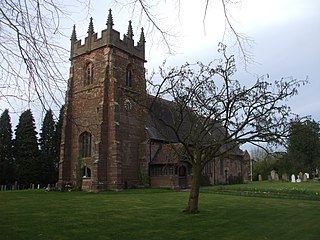
Duke of Kent is a title that has been created several times in the peerages of Great Britain and the United Kingdom, most recently as a royal dukedom for the fourth son of King George V. Since 1942, the title has been held by Prince Edward, Queen Elizabeth II's cousin.

Barton Hartshorn is a civil parish about 4 miles (6.4 km) southwest of Buckingham in Buckinghamshire, within the Buckinghamshire Council unitary authority area. Its southern boundary is a brook called the Birne, and this and the parish's western boundary form part of the county boundary with Oxfordshire. At the 2011 Census the population of the parish was included in the civil parish of Chetwode
The peerage title Earl of Kent has been created eight times in the Peerage of England and once in the Peerage of the United Kingdom. In fiction, the Earl of Kent is also known as a prominent supporting character in William Shakespeare's tragedy King Lear.
Godwin is an English-language surname with Anglo-Saxon origins. It means God's friend and is thus equivalent to Theophilus, Jedediah, Amadeus and Reuel.
Leofwine was appointed Ealdorman of the Hwicce by King Æthelred the Unready of England in 994. The territory of the Hwicce was a kingdom in the Western Midlands in the early Anglo-Saxon period, which soon became a subdivision of Mercia. Leofwine was the son of Ælfwine, who is otherwise unknown, but the family appears to have originated in the East Midlands. Leofwine and his sons were considered by the See of Worcester as spoliators who seized church land, but East Midlands religious establishments regarded them as benefactors.

Edith of Wessex was Queen of England through her marriage to Edward the Confessor from 1045 until Edward's death in 1066. Unlike most English queens in the 10th and 11th centuries, she was crowned. The principal source on her life is a work she herself commissioned, the Vita Ædwardi Regis or the Life of King Edward who rests at Westminster, which is inevitably biased.

Adbaston is a village and a civil parish in the English county of Staffordshire.

Gyrth Godwinson was the fourth son of Earl Godwin, and thus a younger brother of Harold Godwinson. He went with his eldest brother Sweyn into exile to Flanders in 1051, but unlike Sweyn he was able to return with the rest of the clan the following year. Along with his brothers Harold and Tostig, Gyrth was present at his father's death-bed.

Leofwine Godwinson was a younger brother of King Harold Godwinson, the fifth son of Earl Godwin.
Read is a surname of English origins.

The Bishop of Ely is the ordinary of the Church of England Diocese of Ely in the Province of Canterbury. The diocese roughly covers the county of Cambridgeshire, together with a section of north-west Norfolk and has its episcopal see in the City of Ely, Isle of Ely in Cambridgeshire, where the seat is located at the Cathedral Church of the Holy Trinity. The diocesan bishops resided at the Bishop's Palace, Ely until 1941; they now reside in Bishop's House, the former cathedral deanery. Conway became Bishop of Ely in 2010, translated from the Diocese of Salisbury where he was Bishop suffragan of Ramsbury.
Leofwin was a medieval Bishop of Lichfield.
Leofwine was a medieval Bishop of Lindsey.
John is a common English name and surname:
Lewin is a Germanic name, usually originating from either of two different sources, the Old English Leofwine or a variant of the Jewish Levin. People with the name include:
Northman was a Mercian chieftain of the early 11th century. A member of a powerful Mercian kinship (clan), he is known primarily for receiving the village of Twywell in Northamptonshire from King Æthelred II in 1013, and for his death by order of King Cnut the Great (Canute) in 1017. His violent end by Cnut contrasts with the successful career enjoyed by his brother Leofric, as Earl of Mercia during Cnut's reign. Northman is believed to have been an associate of the troublesome ealdorman Eadric Streona, who was killed with him.
Levin is a masculine given name. It is a modern German version of the Old English name Leofwine or the Old German Leobwin or Liebwin, meaning "dear friend." Dutch variants include Lieven and Lievin. A rare modern English variant is Lewin. It can also be a variant of Levi, and is a surname with different origins.

The Anglican Church of St Mary at Templecombe, within the English county of Somerset, was built in the 12th century and is a Grade II* listed building.
This page is based on this
Wikipedia article Text is available under the
CC BY-SA 4.0 license; additional terms may apply.
Images, videos and audio are available under their respective licenses.






